February to June 2017: Photos from Reykjavík, East Lansing, Potsdam, Montreal, and Salta
mercredi 31 janvier 2018 à 00:05January was a relatively quiet month for FSF president Richard Stallman (RMS), so we're taking this opportunity to look back on a few speeches that RMS gave last year and that we did not get a chance to report on.
On February 6th, 2017, RMS was at Reykjavík University, in Reykjavík, Iceland, to give his speech “Free software: For your freedom and privacy,” to about 200 people.

(Copyright © 2017 Daði Sigursveinn Harðarson. Photos licensed under CC BY 4.0.)
He then took the opportunity to go on a small road trip with his hosts, along the southern coast of the island, and take in some spectacular sights (here, along the highway and at Vik beach)…


(Copyright © 2017 Eyþór Máni Steinarsson. Photos licensed under CC BY 4.0.)
…as well as to get some work done, in some unusual locations and unconventional situations (at Seljalandsfoss, and atop an obliging equid, respectively)…


(Copyright © 2017 Free Software Foundation. Photos licensed under CC BY 4.0.)
A couple of months and a number of speeches later, on April 11th, RMS was at Michigan State University, in East Lansing, Michigan, to give his speech “A free digital society,” to a standing-room-only crowd.




(Copyright © 2017 Irem Gokce Yildirim. Photos licensed under CC BY 4.0.)
His host, Professor Bill Dutton, was subdued when asked about the prospects of free software adoption at MSU, mentioning “university central purchasing schemes” as an obstacle, and going on to cite “a lack of awareness” as the main reason there is no migration to free software. “Too many students and faculty accept being controlled by software,” he said. He was, however, pleased with the energy the visit had generated, and excited that RMS's talk had “brought students and faculty together across departmental boundaries” and that “there was interest from across the university,” something that gives us all reason to be hopeful.
The FSF is working hard to move the dial on this issue. You can help by raising awareness at your own school or university, and you might find our information on free software in education useful in making your case.
Later that same month, on April 28th, RMS spoke in Potsdam, Germany, at the invitation of the Hasso Plattner Institute, at the University of Potsdam. His talk was part of the Future Trends in Service-Oriented Computing symposium. The lecture hall was full for RMS's speech “Ethical Principles for Service-Oriented Computing.”1
Andreas Grapentin, a Ph.D. candidate at the Institute who was instrumental in organizing the visit, was pleased with the talk, remarking,
As a long-term advocate of free software and a contributor to several free software projects, co-organizing RMS's visit to Hasso Plattner Institute in 2017 has been a personal highlight for me. It has also been a unique opportunity for everyone at our institute and beyond to meet a true hero of our field, and to learn more about the ethics of software engineering, and the importance of freedom and privacy in society.
After graduating, the majority of our students proceed to join a professional work environment—or maybe found their first startup—and it will be up to them to evaluate the social impact of their work-life decisions and to make sensible choices that will benefit or harm society as a whole. We invited RMS to help educate them about the possible threats that unethical software can impose upon the freedom and privacy of its users, and to help them make informed decisions during their career.
We are very happy that RMS took the time to visit, and was able to present his thoughts on the subject of free software, and possible ethical issues of software services and dis-services in front of more than 200 students, members of staff, professors and members of our research school on service-oriented computing. People here were talking about the event, the concept of free software, and about the importance of ethical choices in software engineering for months afterwards.



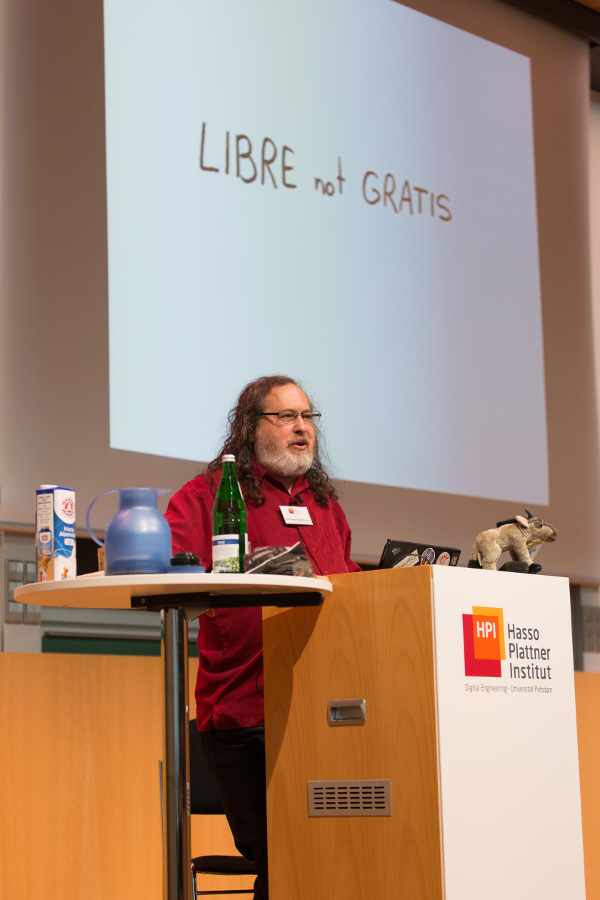


















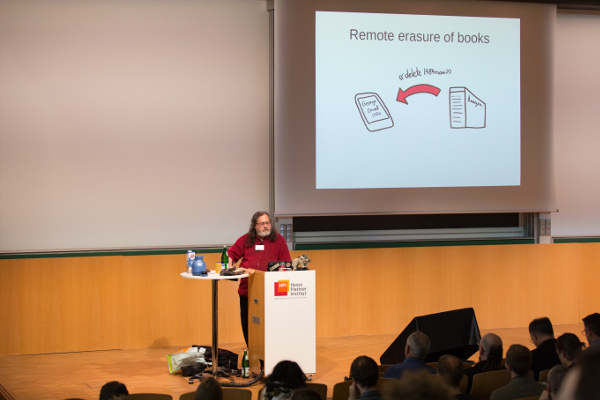


















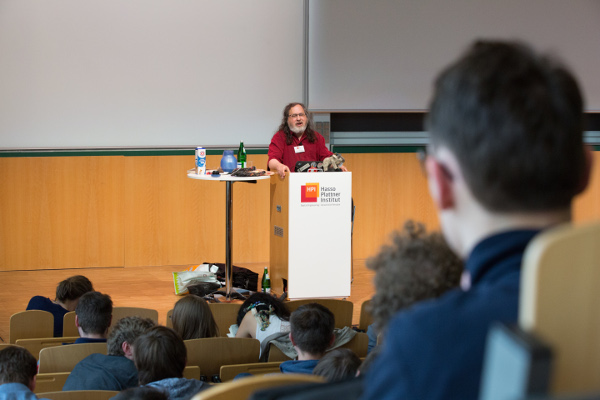
















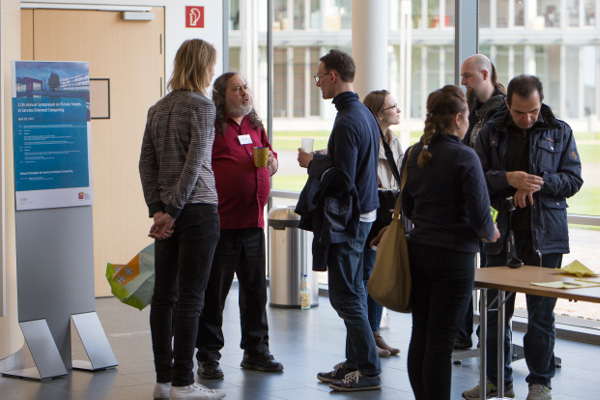
(Copyright © 2017 Toni Mattis. Photos licensed under CC BY 4.0.)
In May, RMS headed to Canada, to take part in “Freeing science—From software to medicine,” a colloquium sponsored and hosted by McGill University, in Montreal. He gave his speech “Free software and your freedom,” on May 12th to an audience of students and researchers and people from the information technology, biotechnology, and pharmaceutical industries.











(Copyright © 2017 Owen Egan. Photos licensed under CC BY 4.0.)
The following month, while he was in Argentina, he went to Salta, to speak at the Universidad Nacional de Salta. It was his first time back since 2004, when the university awarded him an honorary doctorate.
His talk, on June 13th, 2017, was part of a one-day “Jornada de Software Libre,” or free software conference. Following Diego Saravia, who spoke on “Software libre y democracia,” he gave his free software speech “Software libre y tu libertad,” to an audience of about 500 people.

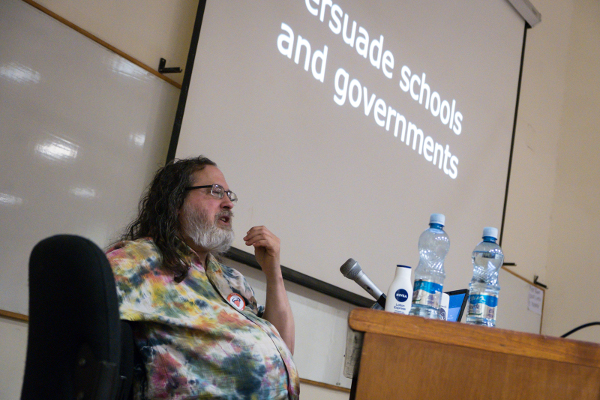
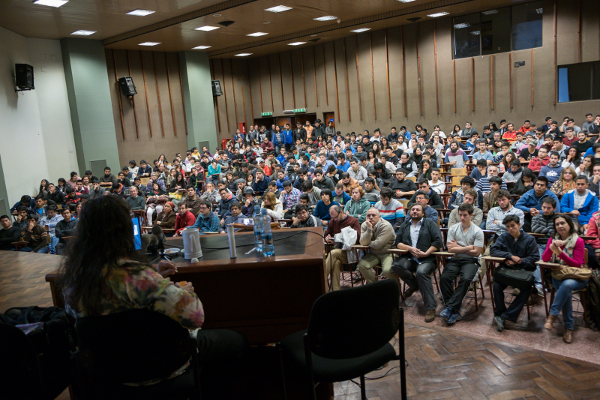
(Copyright © 2017 Universidad Nacional de Salta. Photos licensed under CC BY 4.0.)
Thank you to everyone who made all these trips possible!
Please fill out our contact form, so that we can inform you about future events in and around Reykjavík, East Lansing, Potsdam, Montreal, and Salta.
Please see www.fsf.org/events for a full
list of all of RMS's confirmed engagements,
and contact rms-assist@gnu.org if you'd like
him to come speak.
1. The recording will soon be posted on our audio-video archive.↩
Free Software Directory meeting recap, January 2018
lundi 29 janvier 2018 à 17:43Every week free software activists from around the world come together in #fsf on irc.freenode.org to help improve the Free Software Directory. We had an exciting month working on the Directory with our wonderful stable of volunteers. These folks show up week in and week out to improve the Directory. It's also important to note the valiant efforts of those volunteers who can't make an appearance at the meeting proper, but still plug away at Directory entries during the week.
The new year kicked off to a great start, with the Directory finally crossing over 16,000 packages! This past year, we focused a lot on cleaning up and updating already existing entries. The Directory is much better for the effort. But it's great to see that we were able to continue growing the Directory even while we focused on fixing it up.
We followed that up with some big plans for the future, creating Project Teams to focus and lead the effort on particular issues on the Directory. Some projects have been ongoing, such as cataloging IceCat Plugins. Other projects are just kicking off, or still in need of team captains. Adding this little bit of structure should help get these projects up and running.
The month rounded out with more new additions to the Directory, as well as working on software projects related to radio. All in all, a great start to the new year, and we have much more to look forward to in the months to come.
If you would like to help update the directory, meet with us every Friday in #fsf on irc.freenode.org from 12 p.m. to 3 p.m. EST (16:00 to 19:00 UTC).